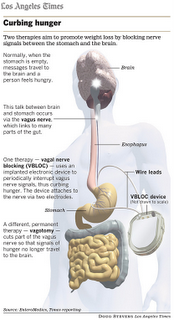VBLOC: Gastric bypass surgery alternative

Los Angeles, CA
Disrupting the vagus nerve, which runs between the gut and the brain, may supplant obesity surgery.
Weight loss surgery works, but is so invasive and has such unpleasant long-term side effects that it's recommended for only a fraction of the obese population, and even many in that group are reluctant to undergo the surgery. In hunting for a simpler and safer alternative, researchers have zeroed in on a nerve that carries much of the communication between brain and gut.
Disrupting this communication, they believe, could lead to safe, effective and sustained weight loss -- mainly by cutting off signals from the gut that tell the brain it's time to eat. The concept still has to be validated, says Dr. Philip Schauer, immediate past president of the American Society for Metabolic and Bariatric Surgery, a Gainesville, Fla.-based association of U.S. weight loss surgeons, "But if it gives even a modest amount of weight loss, it could be a winner."
Two different methods of disrupting the vagus nerve are now in clinical trials. One method, vagotomy, simply cuts the nerve and permanently disables it. The other, vagal nerve blocking, uses an electric current to periodically confuse the nerve and prevent it from transmitting signals. Preliminary results suggest that both methods help to safely reduce excess body weight by about 20% on average within six months of therapy.
Amid the complex set of muscles, nerves and organs that team up to regulate body weight, one anatomical feature stands out: the vagus nerve. Running from the brain through the esophagus and branching out to reach nearly every part of the digestive system, this nerve plays a key role in weight gain.
When the stomach is empty, the vagus nerve informs the brain and triggers the feeling of hunger. When the stomach contains food, the vagus tells the brain and relays back the brain's commands to secrete stomach acid to help digest the food. The brain's control of the passage of food through the digestive system also relies on the vagus nerve. In short, without the vagus, we would get less hungry, and food would stay longer in the stomach.
The vagus nerve does even more than that. While food is being digested, the brain tells the pancreas to make insulin, a hormone that helps store energy from food in fat tissues. That command passes through the vagus nerve. So too does another that instructs fat tissues to grow by absorbing more nutrients. "Everything this nerve does is designed to make you take up energy and put it into your fat," says Dr. Robert Lustig, a pediatric endocrinologist at UC San Francisco and one of the lead investigators in a 30-patient clinical trial of vagotomy for weight loss. "It's your energy storage nerve." Read more VBLOC: Gastric bypass surgery alternative
Labels: VBLOC implant

0 Comments:
Post a Comment
<< Home